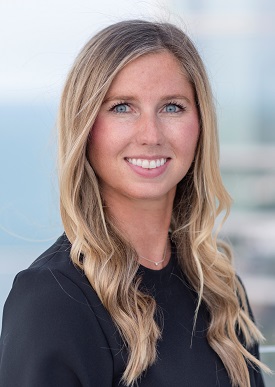The interview below is part of an ongoing effort by McGuireWoods to profile women leaders in private equity (PE). To read previous profiles, click here. To recommend a woman for a future interview, email WPEF@mcguirewoods.com.

Becca Schlagenhauf is a principal at Northwestern Mutual Capital, a Milwaukee-based committed investor in the private debt and equity co-investment markets for over four decades. Schlagenhauf is responsible for managing all aspects of the investment process, including deal origination, business, market and legal due diligence, investment thesis construction, valuation and security pricing and structuring. She also holds portfolio monitoring and credit restructuring responsibilities. Prior to joining Northwestern Mutual Capital, Schlagenhauf worked at Robert W. Baird. She received an MBA from the Kellogg School of Management at Northwestern University and a BA in economics from the University of Notre Dame. Schlagenhauf is also a CFA charterholder.
Q: What both attracted you to PE but potentially concerned you about this chosen career path?
Becca Schlagenhauf: During my time as a sell-side stock analyst, I realized that while I loved investing and thinking about what makes a company valuable, I ultimately didn’t have a passion for the stock market, didn’t like making investment decisions on a quarterly basis and wanted to be the one “pulling the trigger.” PE addressed these issues for me, while Northwestern Mutual Capital afforded me the ability to be a generalist and invest across the risky part of the capital structure.
In switching from public equity to private investing, I was initially concerned about the illiquid nature of the investment and the often non-linear performance throughout a hold period. In public equities, an investor has a daily scorecard, which is helpful in objectively proving your value as a younger analyst. In PE, the time horizon for recognizing the value of your investing abilities is significantly extended.
Q: Why is it important for more women to pursue careers in PE?
BS: From a quantitative standpoint, the benefits of diversity of thought have been widely discussed. For example, a 2017 McKinsey study found that companies in the top quartile of gender diversity were 21 percent more likely to outperform competitors on profits. I believe this translates to investment committees, and I would push it even further. To unlock these superior results, I believe diversity of all kinds is important — not just gender, race or sexual orientation, but also background, socio-economic status, religion and experience.
From a qualitative standpoint, I believe more women in PE will create a virtuous cycle. While I’ve been fortunate to have had truly incredible mentors and sponsors throughout my career, nearly all have been men. By no means do I think mentorship is gender specific, but less than one in 10 senior professionals in PE are women. I believe younger women could benefit from seeing more senior women that have successfully come before them.
Q: What do you think is the biggest challenge facing women in PE today? What advice would you provide to overcome it?
BS: Before answering this question, I want to address the flip side of the coin. I am aware that being a woman in this industry has resulted in certain opportunities and helped me differentiate myself. I am also aware that the women who came before me, not just in PE but in finance in general, had to tackle severe gender issues with an axe as the challenges were blatant and in-your-face. Those trailblazers paved the way for the women in finance today, and for that I am grateful.
That said, I believe many of the challenges facing women in PE today are often much more nuanced than those of the past. While there are undoubtedly still obvious issues in the industry — family leave policies, for example — many of the challenges faced by women are much more subtle. The #MeToo movement has demonstrated these issues are both as prevalent and as complex as ever, but now require a more surgical approach to a solution, like with a scalpel.
These challenges can be frustrating and disheartening, and can often make women in the industry feel incredibly alone and isolated. While it won’t directly solve the problem, I recommend women find an outlet to discuss these issues and how best to handle them. Whether it’s a trusted adviser, an attorney, an advocate at work or a peer group — male or female — I believe having a healthy and safe environment to talk freely is incredibly important.
While easier said than done, I’d push every woman in PE to persist through these challenges, knowing that each and every woman who continues to advance in this industry is changing the landscape in a meaningful way.
Q: How do you believe women of your generation will be able to influence in the PE industry, particularly as the career path continues to evolve?
BS: Today, many firms in the PE space are pushing for diversity. The recognition that diversity is important, whether it’s driven by acknowledgment of the benefits or simply by social pressure, is an important start and the first step to creating an industry that reflects broader demographics. However, I believe the conversation needs to be pushed a step further, not only toward diversity but also inclusion. To me, diversity is about getting different candidates in the door, but inclusion is building an environment where candidates can stay and thrive.
As more women in my generation grow in PE, we can be a voice at the table to help paint the picture of what inclusion looks like. Furthermore, as we rise in seniority, we will become even stronger advocates in both investment committees and for those rising behind us — male or female. As the industry continues to evolve, I am hopeful that we may one day reach an era in which the active pursuit of diversity and inclusion will become a practice of the past, as it will simply be the norm.